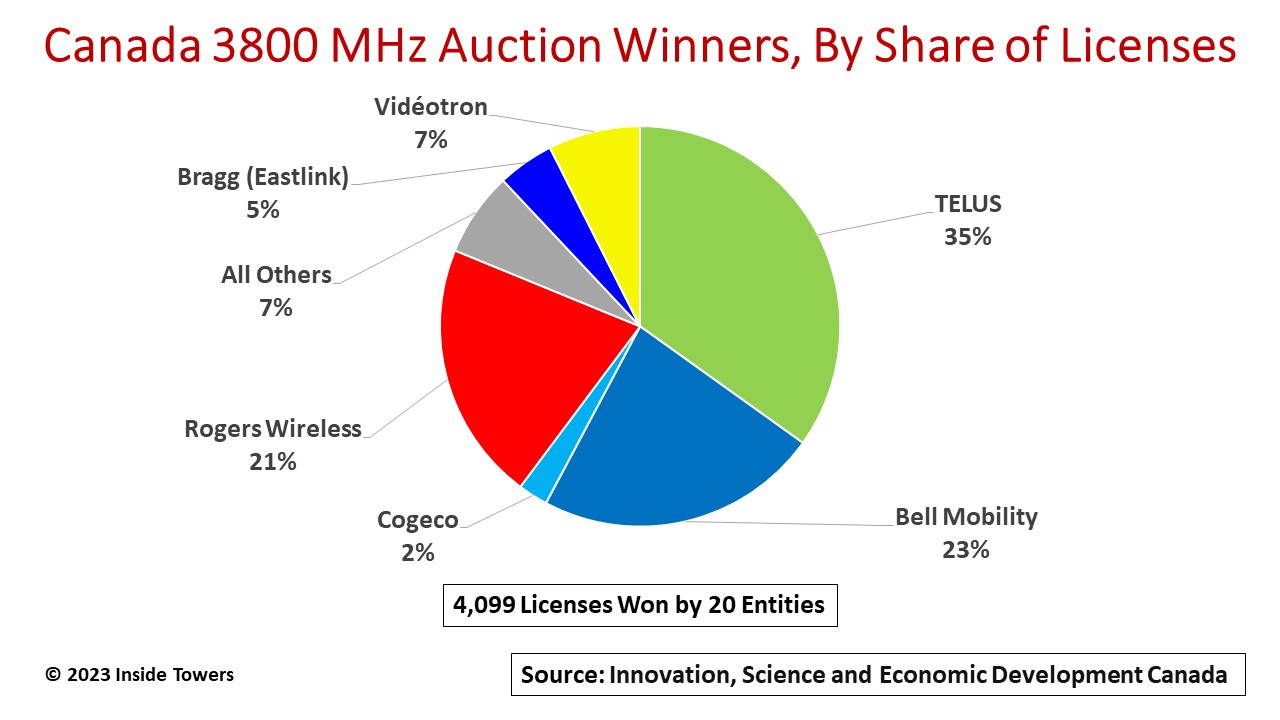Spectrum regulator Innovation, Science and Economic Development (ISED) Canada wrapped up its 3800 MHz auction on November 30. Twenty mobile network operators spent a total of $1.6 billion for 4,099 of the 4,300 licenses available in 172 Tier 4 localized service areas across the country. Not surprisingly, Canada’s Big 3 national MNOs – Rogers Communications (NYSE: RCI), Bell (NYSE: BCE) and TELUS (NYSE: TU) – were the big spenders, accounting for 75 percent of the investment and winning 79 percent of the licenses.
The 3800 MHz auction offered 250 MHz in 25 unpaired contiguous blocks of 10 MHz in the 3650-3900 MHz range, which overlaps portions of the U.S. C-band. The 3800 MHz supports 4G LTE and 5G New Radio equipment that uses 10 MHz channels and likely will drive extended network builds. The 10 MHz blocks can be aggregated up to 100 MHz to create larger bandwidths for broadband applications.
This auction follows the ISED 3500 MHz auction in July 2021 which raised $6.6 billion. While the 3500 MHz spectrum covers 200 MHz in the 3450-3650 MHz range, only an average 111 MHz was auctioned since parts of the band were already occupied by some MNOs.
The greater value of the 3500 MHz auction was due to a combination of: spectrum scarcity, 111 MHz nationwide vs 250 MHz of 3800 MHz; 50 MHz set asides for smaller and regional bidders in many markets, limiting the amount of spectrum available to the national MNOs, leading to higher bids for available licenses; and, a 100 MHz spectrum cap in the 3800 MHz auction when combining with 3500 MHz where MNOs like Bell and Rogers already held 50 MHz in most markets coming into the 3800 MHz auction, according to Frank Rayal, founding partner at XONA Partners in Toronto. Prevailing uncertainties in the macroeconomic environment also kept the 3800 MHz bids down.
The auction leaderboard ended as follows:
- TELUS, headquartered in Vancouver, British Columbia, led the pack taking 1,430 licenses for $457 million covering 33 million of Canada’s nearly 39 million people.
- Bell Mobility, the wireless division of Montréal, Quebec-based Bell Canada won 939 licenses nationwide for $382 million covering 34.6 million people.
- Rogers Wireless, based in Toronto, Ontario, spent $350 million for 860 licenses nationwide, covering more than 35 million people.
- Vidéotron, the communications service provider also based in Montréal, acquired Freedom Mobile as part of the Rogers-Shaw merger, Inside Towers reported. The company bought 305 licenses for $220 million to add to its acquired 3500 MHz holdings in Quebec, southern Ontario, Manitoba, Alberta and British Columbia covering 29 million people.
- Cogeco, another Montréal-based CSP with cable operations in the populated Windsor, Ontario-Quebec City, Quebec corridor, was the fifth largest winner with 99 licenses covering nearly 18 million people for $140 million. The company says this investment complements previously purchased 2500 MHz and 3500 MHz licenses, enabling it to offer mobility in its cable service bundle.
- Of note, Halifax, Nova Scotia-based CSP, Bragg Communications (operating as Eastlink) garnered 187 licenses for over $7 million covering three million people mainly in small cities and towns on the East coast, in central Ontario and parts of Alberta.
By John Celentano, Inside Towers Business Editor





Reader Interactions